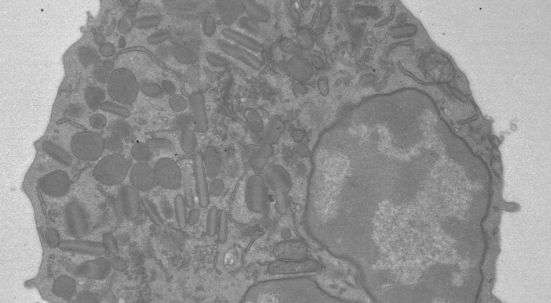'Double agent' cells survival factor revealed

A group of `double agent' cells, which both protect us from some infections while also contributing to tissue damage in various inflammatory conditions, could be manipulated to offer a new approach to treating conditions such as asthma, following research led by the University of Dundee.
Researchers led by Professor Colin Watts in the School of Life Sciences at Dundee have uncovered a critical survival factor for a group of white blood cells called eosinophils.
"Eosinophils play a key role in our immune system, protecting us from some infectious agents but, less desirably, also contributing to tissue damage in various inflammatory conditions," said Professor Watts.
"We have found that a particular protein called cystatin F is critical for the survival for this group of cells. That makes it a potentially attractive target to inhibit the activity of these cells, which may offer a completely new approach to controlling the kinds of inflammatory disease where eosinophils can be harmful."
These cells contain numerous internal structures called granules, which are filled with toxic proteins. These toxins are the weapons that eosinophils use to kill infectious agents such as, for example, nematode worms which cause diseases such as lymphatic filariasis, also known as elephantiasis.
However, these cells can also accumulate in the absence of infections and the same toxins cause substantial tissue damage. In cases of asthma, for example, it can result in damage to the airways.
"An intriguing puzzle has been how eosinophils safely handle and store these toxins and avoid killing themselves," said Professor Watts. "The toxins are only dangerous once they have been activated by enzymes called proteases.
"This new work from our laboratory, carried out by Dr Steve Matthews, shows that the cystatin F protein works like a safety valve and keeps a brake on this protease activity. However, when cystatin F is missing, the `brake' is released, resulting in failure of normal safe toxin packaging and disruption of the granules themselves."
The end result of this process is that the lifespan of the eosinophil is much shorter and those that do survive have reduced granules and lower toxin levels. Working with Dr Rachel Lawrence at the Royal Veterinary College in London, the researchers have shown that loss of cystatin F results in much reduced ability to combat a nematode worm infection. However, there was an important positive benefit as well in that lung damage in a model of asthma was also significantly reduced.
"There are a large number of conditions where the production of excessive numbers of eosinophils can lead to damaging tissue reactions, asthma being a good example," said Professor Watts. "Drugs that inhibit eosinophil survival are already being tested clinically so the discovery of a new factor that promotes survival of these cells is potentially important.
"More work is needed, but we think that blocking cystatin F function may offer a completely new approach to controlling this type of inflammatory disease."
Results of the research have been published in the journal Immunity.


















